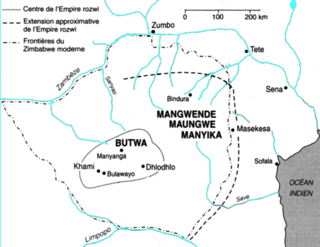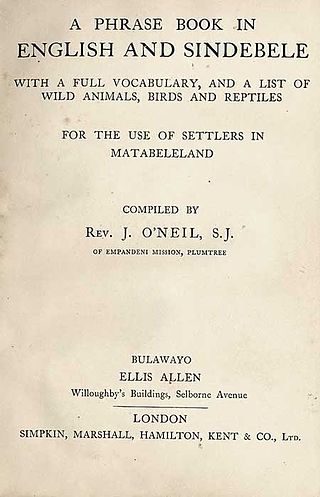Related Research Articles

The Gukurahundi was a series of mass killings in Zimbabwe which were committed from 1982 until the Unity Accord in 1987. The name derives from a Shona-language term which loosely translates to "the early rain which washes away the chaff before the spring rains".

Bulawayo is the second largest city in Zimbabwe, and the largest city in the country's Matabeleland region. The city's population is disputed; the 2022 census listed it at 665,940, while the Bulawayo City Council claimed it to be about 1.2 million. Bulawayo covers an area of 546 square kilometres in the western part of the country, along the Matsheumhlope River. Along with the capital Harare, Bulawayo is one of two cities in Zimbabwe that are also provinces.

Lobengula Khumalo was the second and last official king of the Northern Ndebele people. Both names in the Ndebele language mean "the men of the long shields", a reference to the Ndebele warriors' use of the Nguni shield.

Matabeleland is a region located in southwestern Zimbabwe that is divided into three provinces: Matabeleland North, Bulawayo, and Matabeleland South. These provinces are in the west and south-west of Zimbabwe, between the Limpopo and Zambezi rivers and are further separated from Midlands by the Shangani River in central Zimbabwe. The region is named after its inhabitants, the Ndebele people who were called "Amatabele"(people with long spears – Mzilikazi 's group of people who were escaping the Mfecani wars). Other ethnic groups who inhabit parts of Matabeleland include the Tonga, Bakalanga, Venda, Nambya, Khoisan, Xhosa, Sotho, Tswana, and Tsonga.

MzilikaziMoselekatse, Khumalo was a Southern African king who founded the Ndebele Kingdom now called Matebeleland which is now part of Zimbabwe. His name means "the great river of blood". He was born the son of Mashobane kaMangethe near Mkuze, Zululand, and died at Ingama, Matabeleland. Many consider him to be the greatest Southern African military leader after the Zulu king, Shaka. In his autobiography, David Livingstone referred to Mzilikazi as the second most impressive leader he encountered on the African continent.

The Rozvi Empire (1500–1866) was a Shona state established on the Zimbabwean Plateau by Changamire Dombo. The term "Rozvi" refers to their legacy as a warrior nation, taken from the Shona term kurozva, "to plunder". They became the most powerful fighting force in the whole of Zimbabwe.

The Pioneer Column was a force raised by Cecil Rhodes and his British South Africa Company in 1890 and used in his efforts to annex the territory of Mashonaland, later part of Zimbabwe.

Northern Ndebele, also called Ndebele, isiNdebele saseNyakatho, Zimbabwean Ndebele or North Ndebele, associated with the term Matabele, is a Bantu language spoken by the Northern Ndebele people which belongs to the Nguni group of languages.
The Northern Ndebele people are a Nguni ethnic group native to Southern Africa. Significant populations of native speakers of the Northern Ndebele language (siNdebele) are found in Zimbabwe and in South Africa.
Inyathi is a village located in the Bubi District of Matabeleland North, Zimbabwe that grew from colonization by missionaries in the late 19th century. The Mission itself sits upon around 2,729 hectares of land. Inyathi is about 100 kilometres (62 mi) from Bulawayo and has a number of gold mines that have inspired both corporate and illegal mining.
Mzilikazi High School, is a government-maintained F1 secondary school named in recognition of the Ndebele king Mzilikazi, the founder of the Ndebele Nation. The School is in the city of Bulawayo, Zimbabwe, located along the Old Falls Road, a road that used to link Bulawayo with the Victoria Falls. It is located very close to the famous Mpilo Hospital of Bulawayo. Mzilikazi High School is physically located between Greenspan Suburb and Mzilikazi Township.

Lupane ( luːpɑːnɛ) District is located in the Matabeleland North Province of Zimbabwe, and it is also the Provincial Capital. The District is situated at an elevation of 976 m with a population of 107,000 inhabitants by 2022. Lupane Town is the main center of the district located 172 km from Bulawayo along the A8 Victoria Falls Road. The Government Provincial Administrative offices are located at the Town Centre. A new university near the Town has been established under the name Lupane State University, which caters for the region and beyond. The word Lupane is thought to be a Kalanga or Lozwi word.

The military history of Zimbabwe chronicles a vast time period and complex events from the dawn of history until the present time. It covers invasions of native peoples of Africa, encroachment by Europeans, and civil conflict.
Albert Nyathi is a Zimbabwean poet, musician, writer, actor, and philanthropist. Nyathi is particularly famous for the poem and song "Senzeni na?", which he composed following the assassination of Chris Hani. Nyathi is married to Caroline and they have three children together.
Khayisa Nhlanhlayamangwe Ndiweni (1913–2010) was a chief in Zimbabwe. He was hugely respected in Matabeleland and a revered figure among his people in Ntabazinduna. He became a chief of the Matebele people of Ntabazinduna and Mbembezi in 1939. He was a direct descendant of Gundwane Ndiweni, the Ndebele leader of the Nguni group that split from King Mzilikazi.

Mthwakazi is the traditional name of the proto-Ndebele people and Ndebele kingdom and is in the area of today's Zimbabwe. Mthwakazi is widely used to refer to inhabitants of Matebeleland Province in Zimbabwe.
The House of Khumalo is the reigning royal Family of the former Mthwakazi Kingdom. The Mthwakazi Kingdom was founded in 1823 by Mzilikazi kaMatshobana. While the Mthwakazi Kingdom ended in 1894 with the First Matabele War, The house has endured to the present day.
Maphisa is a small town in the Matobo District of the province of Matabeleland South. It also serves as the seat of Matobo Rural District Council and ultimately the district's largest business centre and development node. Three kilometres west of Maphisa is the Bhalagwe mountain on the Maphisa to Matjilotje Road. Maphisa Town's economic activity includes extensive gold mining by both large scale and artisanal miners. There are also many informal miners locally known as 'oTsheketshe'. It also boasts in excess of a 1500 hectare intensive farming under pivot irrigation system. There is also extensive commercial ranching in its precinct. The legendary liberation fighter Joshua Mqabuko Nkomo's home village is 40km South West of Maphisa. The amenities found in Maphisa include a modern hotel, Minda Mission which provides education from primary to Advanced level. There are modern supermarkets, a referral Maphisa Hospital and Hlalani Kuhle suburb. King Mzilikazi's grave and Cecil John Rhodes's grave are 84km and 65km respectively North East of Maphisa. The Matobo national park, a World Heritage Site is located 50km North East of Maphisa. SADC Icrisat is located 70km North East of Maphisa.

King Bulelani Lobengula kaMzilikazi Khumalo is a Zimbabwean Ndebele king of the Northern Ndebele nation also known as Amahlabezulu tribe, an assertion rejected as unlawful by the Politics of Zimbabwe#Judiciary|High Court of Zimbabwe]]. He succeeded King Lobengula who was overthrown by colonial forces during the 1893 First Matabele War, after which Lozikeyi became queen regnant of the Ndebele. His coronation
took place in a private ceremony in Bulawayo on 28 September 2018. In 2019 he held his first Imbizo in Beria Park, Johannesburg.
Chief Nhlanhlayamangwe Felix Ndiweni is a Ndebele traditional leader from Zimbabwe who is known as one of the few traditional leaders to speak out against the ZANU-PF government. He is a Chief in the Matabeleland region of Zimbabwe. Chief Ndiweni lived in Canvey Island, Essex for several years and left the UK in 2010 to assume the Chieftainship in Matabeleland. Ndiweni is well known criticizing the Zimbabwean government for political abuses, land-use abuses and is a supporter of human rights in Zimbabwe. He is known for calling on the Zimbabwean government to recognize the Gukurahundi genocide. In particular, he has also asked for the return of cattle seized from his father, the late Paramount Chief Khayisa Ndiweni and other ZAPU opposition supporters, during the Gukuranhundi in Matabeleland. He has also asked for Ntabazinduna Police Training Depot which was used by the 5th Brigade Military Unit during that time to be restored as a school. He was arrested in 2019 by the Zimbabwean government, granted bail, and currently has a warrant issued by the Zimbabwean government for his arrest because he is regarded as a "security threat" in Zimbabwe.
References
- ↑ "Tracing the origins of the City of Kings". The Herald. Retrieved 2022-01-25.
- ↑ Rasmussen, R. Kent. “A Lost Man in Southern African History: Kaliphi/Gundwane of the Ndebele.” The International Journal of African Historical Studies 10, no. 1 (1977): 96–110. https://doi.org/10.2307/216893.
- ↑ "Ndebele Kingdom: Who should be crowned Ndebele King". Bulawayo24 News. Retrieved 2022-01-25.
- ↑ "Appendix A: Indigenous systems of awards | South African Government". www.gov.za. Retrieved 2022-01-25.
- ↑ "Origins of the Ndebele in Zimbabwe". Global Black History. 2012-09-05. Retrieved 2022-01-25.
- ↑ "King Mzilikazi's Maternal Heritage".
- ↑ Rasmussen, R. Kent. “A Lost Man in Southern African History: Kaliphi/Gundwane of the Ndebele.” The International Journal of African Historical Studies 10, no. 1 (1977): 96–110. https://doi.org/10.2307/216893.